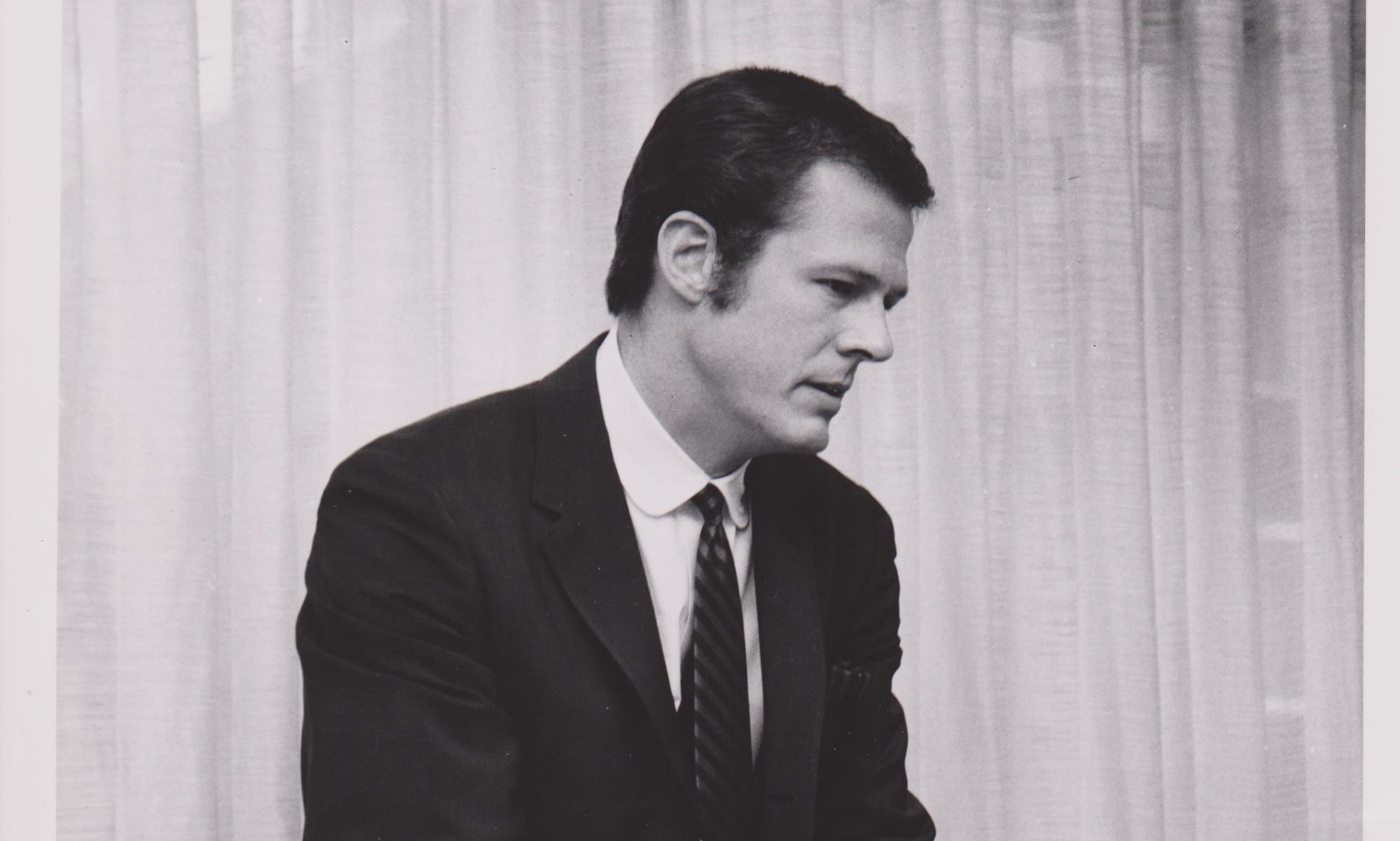While roaming around YouTube lately I came across this foreign trailer for Inside Out. It’s in Farsi. In fact, the description on the video reads (thanks to a Farsi to English translator – though I wouldn’t stake my life on this): “Trailer “the price of a prisoner” Indonesia with Farah F. Voice. Reconstructed by myself.” I have not ever seen what the trailer for US audiences was but I would guess that this is probably pretty close, the only differences being the language overdub and some sound overdubs (the car racing across the bridge to make the jump).
Inside Out Revisited: Tidbits
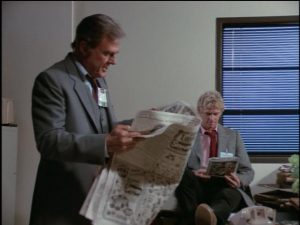 I didn’t start mining through the Google newspaper archive until I was doing research for the movie A Name for Evil and now I find myself getting lost looking back through old newspapers. (I’m a history buff anyway). Subsequently, I’ve been digging through looking for whatever I can for whatever Robert Culp movie or TV show I’m writing about next but since I only just started doing this, movies such as Inside Out (and Hannie Caulder) missed out initially.
I didn’t start mining through the Google newspaper archive until I was doing research for the movie A Name for Evil and now I find myself getting lost looking back through old newspapers. (I’m a history buff anyway). Subsequently, I’ve been digging through looking for whatever I can for whatever Robert Culp movie or TV show I’m writing about next but since I only just started doing this, movies such as Inside Out (and Hannie Caulder) missed out initially.
So, I did a little searching around and found a couple of interesting tidbits for Inside Out. The first being a note in one of Marilyn Beck’s columns from March 19, 1975, saying that Robert Culp took part in a tennis tournament in Berlin during filming of Inside Out. The tournament, held annually, was called “The Divided City Tennis Competition” and Culp’s partner was a US Consul and career CIA political officer, Merron L. Latta. Culp and Mr. Latta defeated their French opponents 9 – 6.
Another tidbit involved not Culp, but Telly Savalas, who endured tabloid garbage from the Daily Mail alleging that during filming he partied all night until 4am, didn’t remember his lines and kept his co-star (James Mason) waiting. Savalas filed a libel suit against the Daily Mail and a year later won, to the tune of $56,700.
Mason, for his part, defended Savalas and paid him compliment in court, talking about how inexperienced people tend to put too much emphasis on learning just the lines, while actors like Savalas exercise a little more creativity with the words and dialogue.
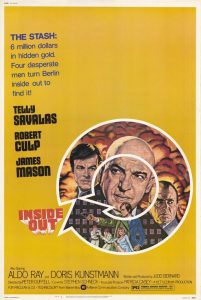
Nowhere in any of the articles I found relating to this was there any comment or quote from Culp, who I imagine kept otherwise busy with the tennis tournament and stayed the hell out of Savalas’s legal issue.
And, of course, I found a few reviews of the movie. Michael Marzella, a staff writer for the St. Petersburg (Florida) Times panned the movie in February of 1976 calling it “dull” and “hollow trash.” He went further to say that after seeing the movie “any jury in the land would convict (the) actors of attempted suspense and recommend no mercy.” For Culp specifically, he noted, “Culp smiles very nicely and usually remembers his lines.”
Ouch. Perhaps Mr. Marzella was just having a bad day?
Another reviewer, Jim Moorhead of The (St. Petersburg, FL ) Evening Independent wasn’t quite as harsh in February of ’76, but he lamented the films’ lack of a clever plot. Despite various faults he found with the movie (the lack of using actual German or Russian dialogue in the scenes involving Germans and/or Russians) he did say the film is “a diverting and amusing evening’s entertainment.”
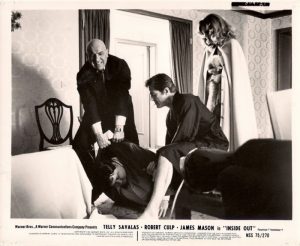
And the last tidbit I found comes from the North Island Gazette of Port Hardy, British Columbia, where the film was screened in the 16mm format fairly early in the film’s release period (March/April, 1976) due to Warner Brothers apparently deciding not to release Inside Out in the 35mm market. This was apparently significant at the time and the Port Hardy screening was only the second such screening of the movie throughout all of British Columbia (after Vancouver). I’m not all that well versed on the technical aspects of the film world at that time, the difference between American and Canadian releases, nor do I fully understand what the difference is between the 16mm and 35mm market – other than the 16mm was usually screened much later after a film’s release, according to the article. But apparently this was a “minor coup” at the time for 16mm markets. If anyone can comment further on this, please do as I’ll admit I’m curious. The article can be read here.
And one final note, from the same Port Hardy article, while the two reviewers in Florida panned the film, Canadian film critic Michael Walsh described Inside Out as “a completely compentent caper film.” I certainly enjoyed the film and you can check out screen caps and my overview here.
Inside Out

Originally released October 1975 (UK), January 1976 (US)
**Contains spoilers**
I purchased this publicity photo of Robert Culp for this movie off eBay back in September 2010. The photo prompted me to try to find this movie as I knew little of it and seriously, a pose like that? Facing down some bad dude, dressed in a military uniform? SOLD!
At the time it was only available on places like iOffer and the occasional vintage VHS tape on eBay. I was almost going go with a DVD “copy” from iOffer when I learned that Warner Brothers would be releasing the film through their Archive Collection as a DVD on demand. It couldn’t have been more than two weeks after I bought the photo and started searching for the movie. Strangely enough the same thing happened when I first “discovered” Culp and went looking for I Spy DVDs. Just a few weeks later, all three seasons were released.
Although there’s mixed reviews out there for Inside Out, I enjoyed the film and found it to be a pretty good caper type movie. Culp plays Sly Wells, an ex-con and former thief, now trying to live quietly and keep out of jail in Amsterdam. Telly Savalas is Harry Morgan, a WWII veteran and former POW living in London trying to find his next big hustle (indeed, his flat is for sale and his car is repossessed at the start of the movie). Harry gets a letter from the former POW camp Kommandant who had a business proposition for him: Help him find six million dollars in Nazi gold persumed lost during the war.

The answer to the gold’s location lies with a high ranking Nazi official who is being held in a high security prison in West Berlin. To get the answer, he’ll have to be removed from the prison for a little while and then returned – with no one knowing he’s gone.
Harry tells the former Kommandant that he knows somebody who might be able to help them. Enter Sly Wells.
Sly is a little gun shy at first (staying out of jail has been nice) but given the potential financial windfall if they pull it off, he agrees. He and Harry fly to West Berlin to meet with former Kommandant Ernst Furben (James Mason). Furben shows them the Seigfried Prison and then Harry sets up Sly and himself at a fancy hotel. Harry then sets out to get some help from a few more players in our caper.

Harry makes a connection with an old friend who is a dealer in precious metals and gems. He agrees to help convert the gold into cash – for a price of course. Further details are hashed out over dinner where Harry is introduced to the lovely Erika – a nurse – and learns about Udo Blimpermann, a man with an insatiable appetite and the owner of the largest West Berlin costume company.
Harry brings Erika and Udo back to the hotel later that evening, although getting Udo to the room causes quote a commotion because he’s eaten too much and has passed out. Harry introduces Sly to the two newest additions to the troop. Sly takes a shine to Erika as she does to him.
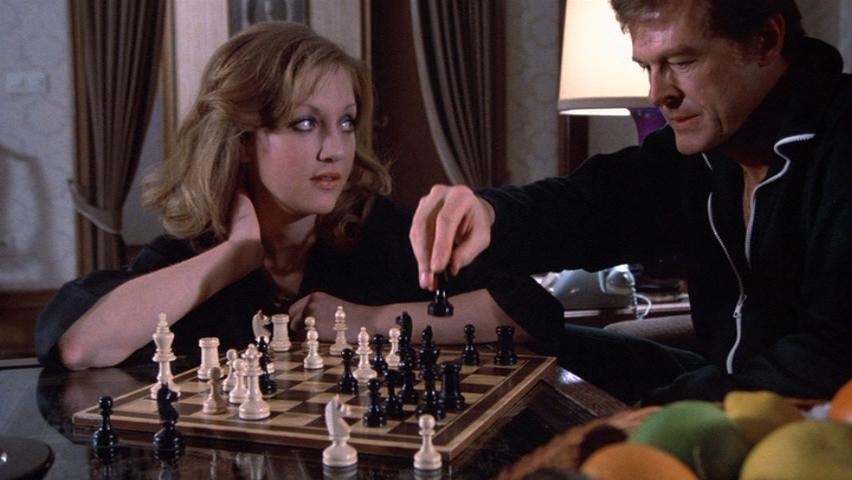
Now if I had met Sly looking the way he did with the black robe and all…I’d have taken a shine too. Chess? I don’t know how to play chess but who cares?!
Ahem. Moving right along…
The next day, Ernst introduces Sly to Schmidt, who served in a transportation company during the war and had originally been assigned to pick up the gold at a train depot. His orders were overruled by the SS at the depot. He didn’t know it was gold that he was going to be picking up but found out when he witnessed one of the boxes drop and break open while being unloaded from the train.
Harry, meanwhile, makes contact with the ranking NCO at the prison, Prior, a guy that was a POW along with Harry during the war. Harry elicits the Master Sergeant’s help (again, for a cut of the profits) and Harry, Sly, Ernst and Schmidt and Prior have a meeting back at the hotel to lay out the early foundation of their plan.
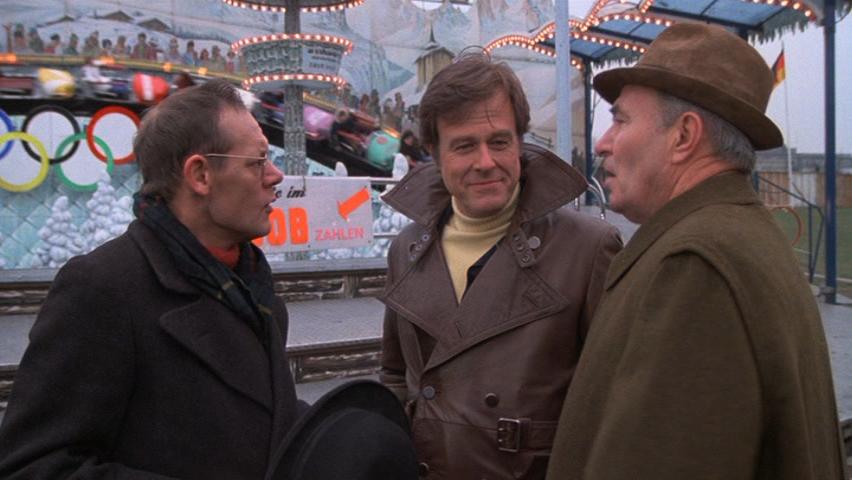
Sly takes care of some logistics with a helping hand from Erika, including finding an abandoned public building to borrow for awhile and a few props to go with it. Erika also studies up on preparing the proper amount of a tranquilizer drug for Holtz – the top Nazi being held at the prison.
Ernst and Schmidt, meanwhile, set up a simple blackmail against the doctor who is allowed in and out of the prison to see Holtz. Holtz, by the way is the only prisoner in the ENTIRE prison. He’s guarded 24 hours a day by an entire compliment of American soldiers.
With everything in place, and American military uniforms care of Udo Blimpermann, Harry and Sly arrive at the prison with the doctor to make the switch, which is to leave the doctor behind in Holtz’s cell and bring Holtz out dressed as the doc. Holtz is told he’s being given a vitamin B12 shot when in fact it’s the tranquilizer. Doc switches his clothes for Holtz’s and Holtz is ready to go. Doc remains behind in the cell and Harry gives the story that Holtz will need to see a dental surgeon in the morning and Master Sergeant Prior issues orders that ensure the prisoner will not be seen by anyone other than the “doc” the next morning – along with a “dental surgeon” (Ernst).

Harry and Sly escort Holtz out of the prison, although barely – a few checkpoint protocols are nearly breached but between Harry (acting as an Army Major) and Prior they manage to pull enough rank to make it out of the prison. They make a quick stop to pick up Erika and as they drive on to the abandoned public building Sly had scouted earlier, Erika and Sly do up some makeup on Holtz to make him look like he did during the war.
At the old courthouse, Harry, Sly and Erika bring Holtz in (who’s just loopy enough under the tranq to walk upright but not comprehend what’s going on). He’s put into a Nazi uniform and stood up at the doorway, just as the effects of the tranq are wearing off. He enters the old courtroom where Ernst, Sly and Schmidt are waiting for him. Ernst wears a uniform of the German High Command, Sly is dressed in the uniform of the SS (the fact that Culp looks so good in it is just so wrong) and Schmidt is dressed as a very convincing Hitler. All of it convinces Holtz that he’s right back in 1942. Hitler wants to know where the gold is. It takes a little time to jar Holtz’s memory but they succeed.
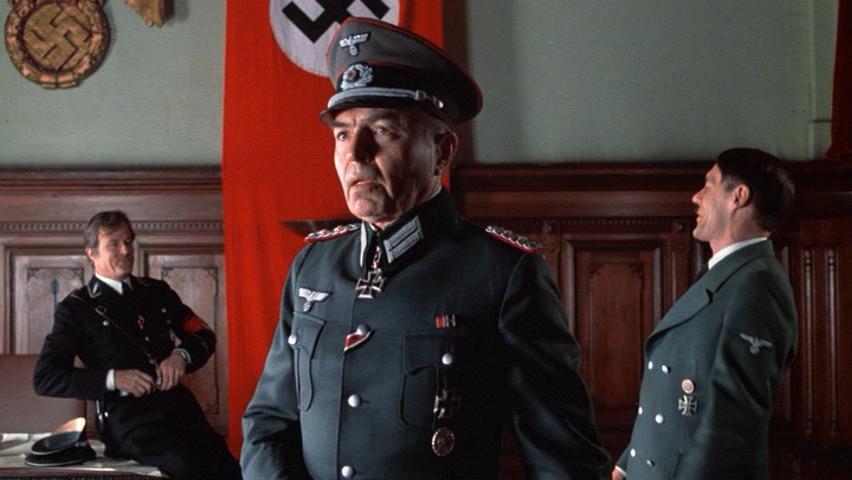
There’s just one slight problem. The location of the gold, at Holtz’s former summer residence, is located in East Germany (remember, this was 1975 and Germany was still very much divided. Berlin, also divided East and West, was located in East Germany). Harry, Sly, Ernst and Schmidt make their way through Checkpoint Charlie and cross over into East Germany. They locate Holtz’s former summer residence and know that the underground bunker was to the left of the residence but here they come up to their next problem: The underground bunker where Holtz hid the gold now has a tenement building sitting over it.

To gain access to the building, Ernst figures to contact a former fellow German soldier who had defected to the Russians at the end of the war. Ernst is sure they can get his help, with the promise of a cut. The man’s loyalty to the Russians, however, proves stronger. He holds everyone at gunpoint until a Russian colonel arrives.
The Russian colonel, however, is more easily persuaded by money. He shoots down Ernst’s former comrade and instead of arresting the Americans, he agrees to help them to get the gold – for a cut.
Sly, knowing they might need an ace in the hole, manages to snag the dead East German’s gun without the Russian seeing him and quietly pockets it in his trench coat.

The Russian colonel mobilizes the East German police and has the building evacuated under the guise of there being an unexploded bomb inside. Harry, Sly, Ernst and Schmidt go in as a bomb disposal team. They access the bomb shelter by blowing a hole through the basement floor. Down in the bunker they find the gold, hidden behind a folding dressing screen. The fruits of their labor realized, the four men bask for a moment in the glow of the gold.
They load up the gold in their truck and return to the garage of Holtz’s summer residence (next door to the tenement building) to change back to their American uniforms and get the hell out of Dodge. When Schmidt goes to open the garage doors, however, the Russian colonel is right there. He orders them to load the gold into his car after which he will kill them. Harry attempts to disarm the Russian only to trigger a brief but chaotic shootout in the garage. Schmidt goes down by the Russian’s gun, Sly takes the Russian down. Harry doesn’t allow much of a pause upon Schmidt’s death and he, Sly and Ernst clear out immediately following the shooting. They get half way to the checkpoint when Sly suddenly turns the car in a 180. At the checkpoint crossing they came over with four in the car, he explains. They had to go back with four in the car.

So they go back for Schmidt, sit him up in the back seat and head back to the checkpoint. They clear through, but not before being told the flags on their car are on wrong. (Dead body in the back seat? No problem. Flags wrong on staff car? Problem). The guard at the checkpoint fixes the flags and then sends them on their way. Cleared through, they stop at a bridge to dump Schmidt’s body into the river. They then arrive at the business of the gem dealer to unload the gold. Sly makes one final stop to see Erika, who has been keeping a watch over a more heavily sedated Holtz, to let her know they had been successful.
The next morning, Harry, Sly and Ernst head back to the Siegfried Prison with Holtz, but not before being held up by a jackknifed truck and pile of wooden shipping pallets all over the road. The clean up will only take about five minutes…but they have to wait an hour for a tow truck. The boys certainly don’t have an hour to wait so Harry makes a suggestion to Sly: Jump the car. Sly thinks he’s crazy but they had little choice so Sly agrees to do it.

I loved Culp’s look of grim determination as he’s speeding the car across the bridge. Successfully jumping the car, they continue on to the prison and arrive to return Holtz back to his prison cell (but not without nearly getting their cover blown). Nonetheless, they get Holtz back in, they (and the Doc) get back out and after leaving their car in the middle of a busy street in West Berlin, the only thing left for Harry, Sly and Ernst to do is laugh all the way to the bank.

As I said at the beginning, despite mixed reviews, I enjoyed this one. There is one part where the movie drags a little and I literally looked at my watch and thought “Uh, fellas, you got about 30 minutes left of this movie and you haven’t gotten Holtz out of the prison yet!” But those last 30 minutes move a good pace. The music in this thing was the only thing I had a problem with. The dramatic music was good, but the cheezy-even-for-the-70s wah wah stuff seemed poorly chosen.
I also found interesting seeing the scenes of West Berlin of that time period, especially the scene where Erika and Sly go to the observation deck at the checkpoint and look toward East Berlin. The portion of the Berlin Wall that can be seen didn’t have as much graffiti on it as it did by the time it came down in 1989 and the part of East Berlin that can be seen looks frozen in time, with wrecked buildings that made it look like the war had ended yesterday, not thirty years earlier.
A good film and an enjoyable Culp performance!
“Inside Out” is available from the Warner Brothers Archive and also through Amazon.com.
